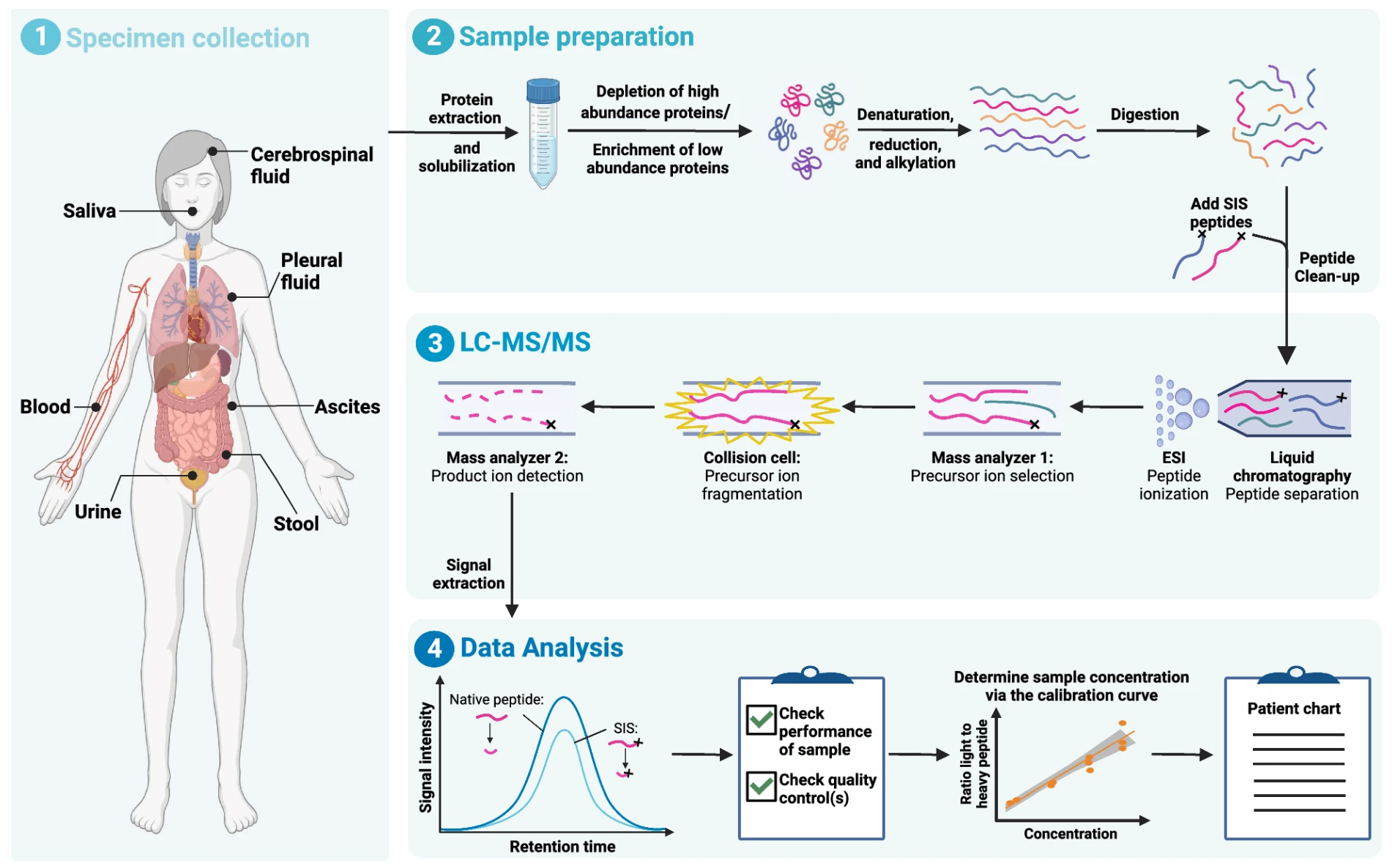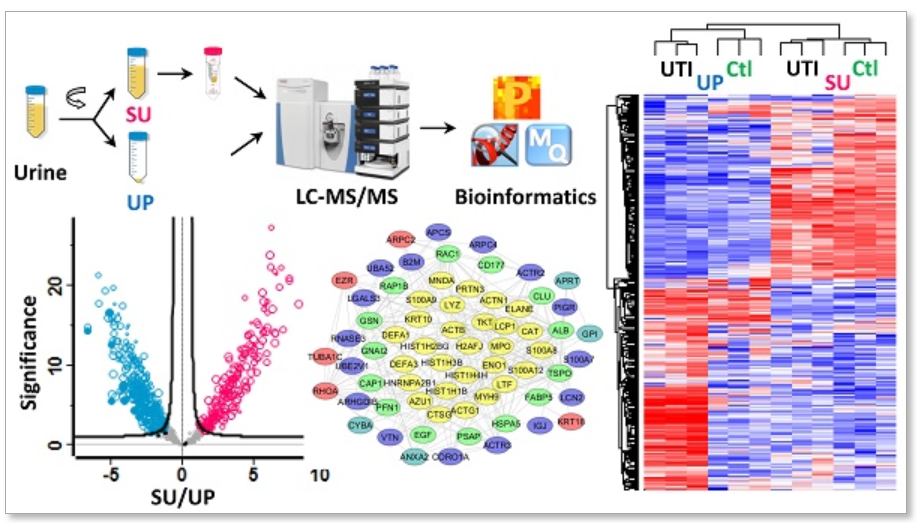Clinical Proteomics Research Solutions
- Cancer
- Neurodegenerative diseases
- Cardiovascular diseases
- Metabolic disorders
- Immune diseases
- Infectious diseases
- Rare diseases
- Inflammation
- Sample Types: We accept various clinical sample types, including body fluid, tissue, cell, FFPE, etc.
- Storage and Shipping: Samples should be stored at -80℃ and shipped with dry ice.
Clinical proteomics is the large-scale study of proteins in a clinical context, focusing on their roles in disease detection, progression, and therapeutic response. Proteins, being the primary executors of cellular function, provide valuable insights into the molecular mechanisms underlying health and disease. Proteomics analyzes the expression, modifications, and interactions of proteins, offering a more comprehensive view of biological processes compared to traditional genomics. This approach is crucial in understanding how specific proteins contribute to disease mechanisms, offering potential for novel therapeutic targets and diagnostic biomarkers.
Moreover, proteomics is integral to personalized medicine, where treatments can be tailored based on an individual’s proteomic profile, thereby improving treatment efficacy and minimizing side effects. By profiling biomarkers in clinical trials, proteomics also helps in the identification of drug targets, predicting patient responses, and understanding the mechanisms of therapeutic drugs, contributing to targeted therapeutic strategies.
Service at MtoZ Biolabs
MtoZ Biolabs offers Clinical Proteomics Research Solutions that utilize cutting-edge technologies to address complex challenges in clinical research. Our service leverages high-resolution mass spectrometry and advanced bioinformatics tools to perform comprehensive proteomic analysis for a variety of clinical applications. We specialize in analyzing protein expression, post-translational modifications (PTMs), protein-protein interactions (PPIs), and more, to uncover molecular insights into diseases and therapeutic responses.
MtoZ Biolabs' Clinical Proteomics Research Solutions are designed to solve key issues in:
✔️Preclinical research and drug development: By profiling disease-specific proteins and identifying novel drug targets.
✔️High-throughput proteomic analysis of clinical samples: Enabling large-scale protein quantification from plasma, serum, and tissue samples.
✔️Disease-related biomarker discovery and validation: Identifying biomarkers for early diagnosis, disease progression, and monitoring treatment efficacy.
✔️Personalized medicine and precision therapy: Profiling patient-specific proteomic profiles to guide tailored treatments.
✔️Clinical trial applications: Assessing drug efficacy and mechanisms of action through proteomic biomarkers.

Figure 1, Typical Workflow for the Analysis of Protein Cancer Biomarkers from Liquid Biopsies via Targeted Mass Spectrometry
Service Advantages
1. Advanced Analysis Platform: MtoZ Biolabs established an advanced clinical proteomics research platform, guaranteeing reliable, fast, and highly accurate analysis service.
2. One-stop Service: MtoZ Biolabs offers one-stop Clinical Proteomics Research Solutions from sample preparation, LC-MS/MS analysis to data analysis, saving your time and efforts.
3. Customizable Service: Personalized service to meet various research needs.
4. One-Time-Charge: Our pricing is transparent, no hidden fees or additional costs.
Applications
Our Clinical Proteomics Research Solutions are applicable to the following types of diseases research:
Sample Submission Suggestions
*Note: Please contact us if you have any special requirements or need assistance with your sample preparation.
Case Study
Application of Clinical Proteomics in Urinary Tract Inflammation Research
This study explores the urinary proteome during urinary tract inflammation. Researchers analyzed 33 urine samples, including 12 from patients with urinary tract infections (UTI), to examine protein distribution in soluble urine (SU) and urinary pellet (UP) fractions. Using mass spectrometry-based metaproteomic approaches, they identified 5,327 unique human proteins, with 2,638 in SU and 4,379 in UP. The analysis revealed that local inflammation alters the proteome, with distinct signatures for UTI, vascular injury, and epithelial cell exfoliation. UTI samples showed clusters of neutrophil effector proteins, essential for immune defense and tissue repair. These findings enhance the understanding of the urinary proteome in inflammatory conditions and provide a reference for biomarker discovery in clinical research.

Yu, Y. et al. Theranostics. 2017.
FAQ
Q: What methods are used to validate biomarkers identified in clinical proteomics research?
Biomarkers identified in clinical proteomics research are validated using techniques such as Western blotting, ELISA, mass spectrometry-based targeted assays (e.g., PRM or MRM), and immunohistochemistry. These methods confirm the presence, abundance, and functional relevance of biomarkers in clinical samples, ensuring their sensitivity, specificity, and reproducibility. Additionally, clinical validation is performed by correlating biomarker levels with clinical outcomes to assess their diagnostic or prognostic value.
Deliverables
1. Comprehensive Experimental Details
2. Materials, Instruments, and Methods
3. Total Ion Chromatogram & Quality Control Assessment
4. Data Analysis, Preprocessing, and Estimation
5. Bioinformatics Analysis
6. Raw Data Files
With our comprehensive Clinical Proteomics Research Solutions, MtoZ Biolabs help researchers and clinicians navigate the complexities of disease mechanisms, therapeutic development, and personalized patient care. Free project evaluation, welcome to learn more details!
How to order?







